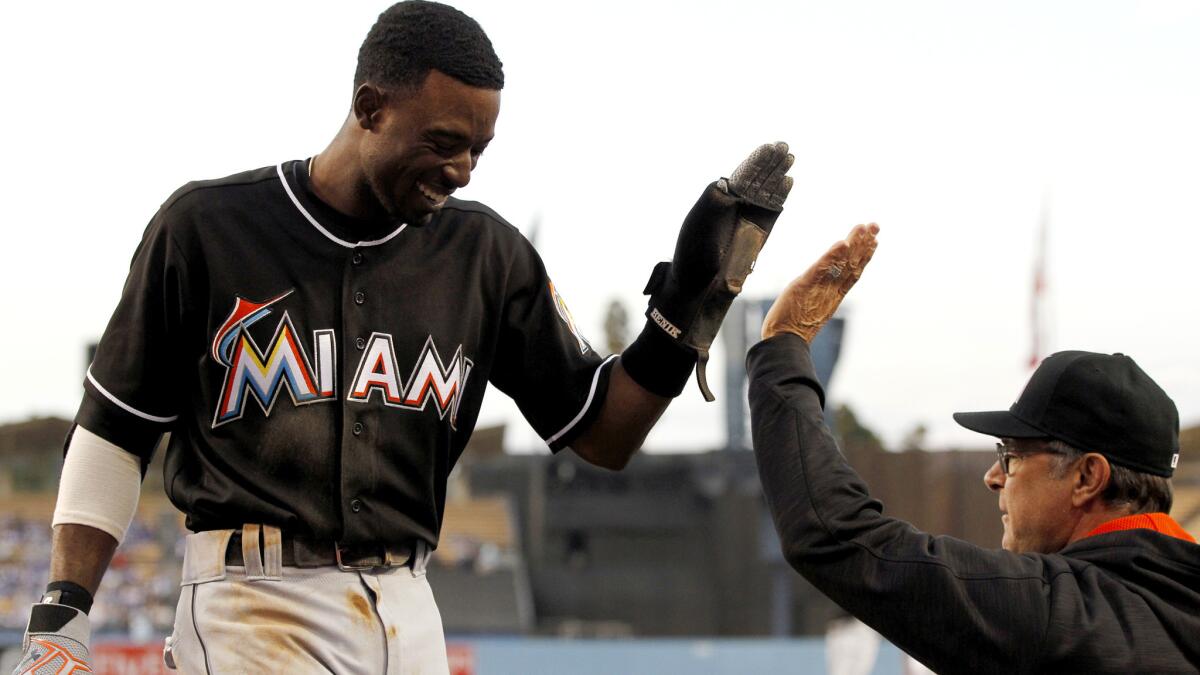Column: How a good guy like Dee Gordon turned into a villain

Marlins second baseman Dee Gordon is congratulated by Manager Don Mattingly after scoring against the Dodgers during their game Wednesday.
When Miami Marlins Manager Don Mattingly spoke to reporters about Dee Gordon’s 80-game drug suspension for the first time, he didn’t sound irritated, as he often does when questioned about something unpleasant.
Mattingly was heartbroken. You could see it in his eyes, hear it in his voice.
“I feel like he’s one of my kids, to be honest with you,” said Mattingly, who also managed Gordon with the Dodgers.
Mattingly almost certainly wasn’t alone. Gordon would be likable in any segment of society, but his personality especially stood out in baseball, where a number of players are self-absorbed and emotionally underdeveloped. The mistake was in thinking someone like this would be above cheating.
Gordon’s positive test was a reminder of an uncomfortable truth about human nature, which is that everyone has a price. With millions of dollars at stake, it would be incredibly naïve to think only the complete scoundrels would cheat. Offer a reward that’s extreme enough and it will compromise even the most admirable of constitutions.
Even Gordon’s, evidently.
Gordon is one of the warmest and most polite players in his sport, which in and of itself says a lot about who he is. He lost his mother when he was 6 — she was murdered by a boyfriend — and could have become bitter or downcast. He had the fortitude instead to develop a consistently upbeat persona.
Some players with positive images are friendly in front of television cameras but nowhere else. Others are selective with whom they interact, engaging primarily with those who can enhance their public profiles.
Gordon never displayed that kind of cynicism. He traded jokes and talking about sneakers with Japanese reporters who never wrote about him. He never attempted to magnify his status by pretending not to know someone’s name.
So when Gordon emerged as a star last year in the wake of his trade to the Marlins, almost everyone in the game was delighted for him. He topped the National League in both hitting and steals, becoming the first player to do so since Jackie Robinson in 1949.
One of the good guys had won.
But now this happened.
Gordon inflicted further damage to his reputation Friday when he released a statement saying he didn’t know how anabolic steroids entered his system, which is baseball’s equivalent of the-dog-ate-my-homework excuse.
If Gordon could cross that invisible line separating the players who don’t cheat from the ones who do, what would stop anyone else?
Fair or not, everyone is now a suspect.
If the past decade dispelled myths about what a steroid user’s body should look like, Gordon’s suspicion did the same for what a steroid user’s personality profile should be.
And, really, as disappointing as it is, it shouldn’t be a surprise.
It was only two years ago that Gordon went to spring training as a player without a place on the Dodgers roster. Displaced by Hanley Ramirez as the starting shortstop, he had spent the majority of the previous season in the minor leagues. His existence as a professional athlete was in danger.
Gordon is now in the first year of a five-year, $50-million contract. His suspension will cost him only $1.6 million.
Provided he didn’t start using drugs this year, his decision to run afoul the rules was a no-brainer of business decision.
::
The last time I saw Andrew Friedman, I jokingly introduced him to someone as “the guy who traded Dee Gordon.”
I suppose I should take this opportunity to apologize to Friedman, as well as Dodgers General Manager Farhan Zaidi, who had to listen to me make wisecracks about Gordon over the last however many months.
::
Am I the only one who thought Laremy Tunsil’s leaked bong-mask video was hilarious?
It reminded me of that line in South Park: “There’s a time and place for everything, and it’s called college.”
Yes, Tunsil was doing something stupid, but at least he was creative.
I would still be laughing if the video hadn’t cost the kid more than $10 million.
So let me get this right: A person can smoke pot and become the president of the United States, but not an offensive tackle for the Baltimore Ravens?
The price Tunsil paid is dumbfounding, considering the recreational use of marijuana is now legal in four states. The fact that almost everyone was able to immediately identify what Tunsil was doing was evidence of how ubiquitous the drug has become in our culture.
Let’s not act as if he was freebasing or injecting black tar heroin.
::
Lakers President Jeanie Buss’ radio interview with Colin Cowherd this week did nothing to temper the widespread speculation that Phil Jackson will eventually return to Los Angeles.
Buss said she would like for Jackson, her fiance, to rejoin the organization, but that the idea was shot down by Jim Buss, her brother. Of course, if Jim Buss is held to his self-imposed mandate of turning the Lakers into contenders by next season, he might not be here much longer to resist the move.
::
Jeanie Buss also said she didn’t know Byron Scott would be fired until after it happened. Lakers fans should hope she was only trying to distance herself from the decision. If she was really clueless about a move of that magnitude, it’s not a good sign about the inner workings of the organization.
::
The excitement over the Lakers’ interest in Warriors assistant coach Luke Walton would be understandable if Walton could bring Steph Curry to Los Angeles with him.
::
Southern California will never be mistaken for a hockey market, but it feels strange for neither the Kings nor the Ducks to still be playing.
::
Shortstop Aledmys Diaz went into Friday batting .446 with four home runs and 13 runs batted in for the St. Louis Cardinals. A Cuban defector, Diaz was signed for $8 million in 2014.
The Dodgers also signed a Cuban shortstop around that time. His name was Erisbel Arruebarrena and he cost $25 million. Arruebarrena was batting .170 through his first 15 games in double A this year.
::
It’s really a shame Tyson Fury isn’t a better fighter. Boxing can use a long-reigning heavyweight champion with his colorful personality.
In a news conference this week to promote his July rematch with Wladimir Klitschko, Fury said half-joking, “It’s an absolute disgrace to call me an athlete.”
He then removed his shirt, exposing a soft midsection.
“Does that look like a fighter’s body?” Fury asked. “Absolutely not.”
Fury then turned to Klitschko and said, “Shame on you, my friend. … You lost to a fat man.”
::
Who knows who’s to blame for the mess that resulted in Conor McGregor’s removal from UFC 200, but this much is clear: No mixed-martial artist has the leverage to take on the UFC and its president, Dana White.
Follow Dylan Hernandez on Twitter: @dylanohernandez
More to Read
Go beyond the scoreboard
Get the latest on L.A.'s teams in the daily Sports Report newsletter.
You may occasionally receive promotional content from the Los Angeles Times.











